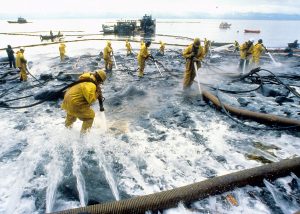In March 1989, the Exxon Valdez oil tanker ran aground, causing 11 million gallons of crude oil to spill into Prince William Sound, adversely effecting 1,500 miles of Southcentral Alaska’s coastline. For 10th graders in Social Studies, there are many aspects to consider when grappling with the consequences of the spill, then the largest in U.S. waters. It devastated the sea life of the region, killing untold thousands of seabirds, otters, seals, and whales. The economy of Southcentral was disrupted, in many cases for years, as the livelihoods of fisherman from communities across Prince William Sound depended on the catch of salmon and herring. Further examinations may encompass the long-term scientific, environmental, socio-economic, emotional, financial, legal, and political impact of the spill.
http://www.history.com/topics/us-states/alaska/videos/history-exxon-valdez-oil-spil
A number of potential questions to pose:
- As a devastating human-caused environmental disaster, how did the Exxon Valdez oil spill affect the mythology of Alaska as a pristine wilderness?
- In what ways has the discourse changed, if at all, as a direct result of Exxon Valdez when discussing Big Oil, both within Alaska (as an oil beholden state), and the broader American public, particularly in light of the Deepwater Horizon oil spill of 2010?
- How did governmental, business, and environmental agencies respond to Exxon Valdez, and in what ways have oil spill response procedures evolved?
- What is the current state of sea life in Prince William Sound?
- How have the commercial fisheries-salmon and herring, in particular, of Prince William Sound rebounded 27 years after Exxon Valdez?
- What was the response of the Native people of Southcentral Alaska to Exxon Valdez?
- Over the course of two 1-hour class periods, students will first be presented with the evidence on myriad aspects of the Exxon Valdez oil spill, its toll on both humans and the environment, with the purpose of holding a trial. Students will have the opportunity to advocate for the oil industry, the fisherman, the sea life, and Alaska Natives. Students are encouraged to do research on their own.
- On the second day, the trial commences.
I’m clearly not sure what to do with this trial idea. What would be the expected outcome other than, “Exxon is guilty?” Any other insights folks may have would be greatly appreciated.

Hey Jerry, cool idea. I’ve always been under the understanding that the only PWS commercial fishery that never recovered after the spill was the herring fishery. Which was a huge fishery from what I’ve heard and one that was really hurt because the herring spawn was going on right when the spill occurred.
However, a few years ago I became aware that a major reason the herring have never rebounded in PWS to their former numbers seems to be due to increased numbers of humpbacks feeding on herring. There are SO MANY more humpbacks in Alaskan waters than there were 70, 40, or even 20 years ago as their numbers continue to recover from commercial whaling. Anyway, here are some links: http://www.afsc.noaa.gov/Quarterly/ond2010/ond2010feature.pdf
http://juneauempire.com/outdoors/2014-07-18/whales-may-impact-herring-stocks-recovery
http://www.adn.com/alaska-news/article/whales-not-oil-may-be-blame-herrings-decline-alaskas-prince-william-sound/2010/09/10/
Jerry,
An excellent subject to explore. I have lots of experience in setting up mock trials and can share that in person. Remember that you could have “testimony” from a variety of experts, indigenous people, even animals. Also it could move beyond simple guilt and innocence and include assessing a penalty and / or coming up with alternatives so that it does not happen again.
Lots of places to go with this idea!